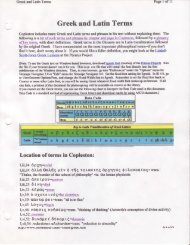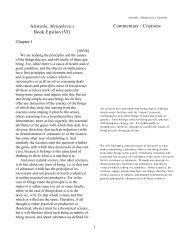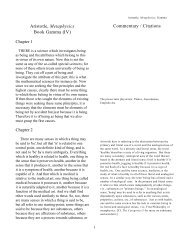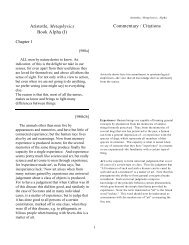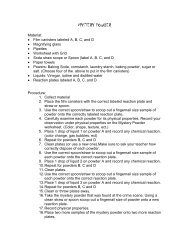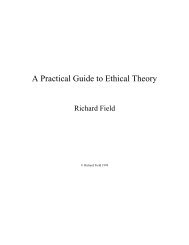Aristotle, Metaphysics Book Zeta (VII) Commentary ... - CATpages
Aristotle, Metaphysics Book Zeta (VII) Commentary ... - CATpages
Aristotle, Metaphysics Book Zeta (VII) Commentary ... - CATpages
You also want an ePaper? Increase the reach of your titles
YUMPU automatically turns print PDFs into web optimized ePapers that Google loves.
<strong>Aristotle</strong>, <strong>Metaphysics</strong>, <strong>Zeta</strong><br />
categories also,-not essence in the simple sense,<br />
but the essence of a quality or of a quantity. For<br />
it must be either by an equivocation that we say<br />
these are, or by adding to and taking from the<br />
meaning of 'are' (in the way in which that which<br />
is not known may be said to be known), the truth<br />
being that we use the word neither ambiguously<br />
nor in the same sense, but just as we apply the<br />
word 'medical' by virtue of a reference to one and<br />
the same thing, not meaning one and the same<br />
thing, nor yet speaking ambiguously; for a<br />
patient and an operation and an instrument are<br />
called medical neither by an ambiguity nor with a<br />
single meaning, but with reference to a common<br />
end. But it does not matter at all in which of the<br />
two ways one likes to describe the facts; this is<br />
evident, that definition and essence in the<br />
primary and simple sense belong to substances.<br />
Still they belong to other things as well, only not<br />
in the primary sense. For if we suppose this it<br />
does not follow that there is a definition of every<br />
word which means the same as any formula; it<br />
must mean the same as a particular kind of<br />
formula; and this condition is satisfied if it is a<br />
formula of something which is one, not by<br />
continuity like the Iliad or the things that are one<br />
by being bound together, but in one of the main<br />
senses of 'one', which answer to the senses of 'is';<br />
now 'that which is' in one sense denotes a 'this',<br />
in another a quantity, in another a quality. And so<br />
there can be a formula or definition even of<br />
white man, but not in the sense in which there is<br />
a definition either of white or of a substance.<br />
substances.<br />
Chapter 5<br />
It is a difficult question, if one denies that a<br />
formula with an added determinant is a<br />
definition, whether any of the terms that are not<br />
simple but coupled will be definable. For we<br />
must explain them by adding a determinant. E.g.<br />
there is the nose, and concavity, and snubness,<br />
which is compounded out of the two by the<br />
presence of the one in the other, and it is not by<br />
accident that the nose has the attribute either of<br />
This is a puzzle concerning what in Aristotelian thought<br />
are called 'properties'--characteristics that are proper to a<br />
certain subject, and which thus stand between essential<br />
characteristics and accidents. The distinction between<br />
these three concerns the relation to their subjects. An<br />
essential characteristic appears in the definition of its<br />
subject. Thus if 'rationality' is essential to a human, the<br />
human species is defined in terms of rationality as the<br />
difference--that characteristic in humans that distinguishes<br />
them from o ther animals. T he subject o f a property,<br />
7



